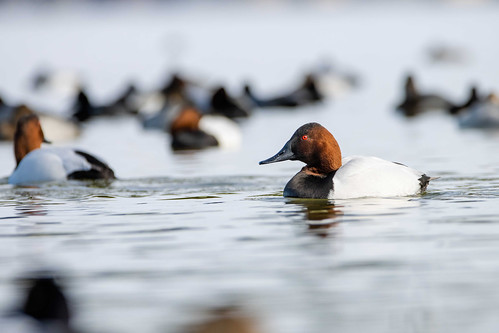Annual Survey of Wintering Waterfowl Finds Increase in Diving Ducks

Canvasbacks in the Choptank River, photo by Kenny Page, submitted to the 2022 Maryland DNR Photo Contest.
In early January, aerial survey teams of pilots and biologists from the Maryland Department of Natural Resources (DNR) made visual estimates of the ducks, geese, and swans along most of the state’s Chesapeake Bay, Potomac River, and Atlantic coast shorelines. This year, the teams counted about 632,200 waterfowl, which was higher than the 563,800 birds observed in 2022 but lower than the most recent five-year average of 682,520 birds.
“The distribution and abundance of wintering waterfowl is influenced not only by the annual changes in population size, but also the weather conditions during migration and throughout the winter,” said Wildlife and Heritage Director Paul Peditto. “The surveys our staff conduct provide a snapshot of where waterfowl are located in the state and are combined with data from other states in the flyway to track the status of several important waterfowl species.”
Overall, dabbling ducks were similar (93,600) to 2022 (97,600). While the number of pintails counted in the survey dropped slightly (3,300 in 2023 and 4,600 in 2022), mallards (56,800) and black ducks (21,800) remained similar to their respective 5-year averages (53,920, and 24,580). Despite the generally mild winter, a mid-December cold snap across the country likely led to more diving ducks (190,300) being observed on the Chesapeake and tributaries than in the 2022 survey (79,400).
Biologists counted 320,800 Canada geese in the 2023 survey which was similar to the 361,100 counted in 2022. The 2023 count was likely negatively affected by the warm early January weather, which allowed many wintering geese to roost and feed further inland away from survey routes. Positive reports from many goose hunters appear to confirm this theory.
The Midwinter Waterfowl Survey has been conducted annually since the early 1960s – except 2021 – and covers most of the tidal shorelines and near-shore waterfowl habitat in Maryland. The 2021 Mid-Winter Survey was not flown due to human health concerns related to COVID-19.
Midwinter Waterfowl Survey Results 2018-2023*
(figures rounded to the nearest hundred)
(figures rounded to the nearest hundred)
| Species | 2018 | 2019 | 2020 | 2022 | 2023 |
| Mallard | 64,300 | 39,000 | 56,000 | 53,500 | 56,800 |
| Black Duck | 38,300 | 17,200 | 21,000 | 24,600 | 21,800 |
| Gadwall | 3,100 | 4,800 | 10,800 | 6,800 | 3,400 |
| Widgeon | 700 | 1,200 | 1,100 | 300 | 1,900 |
| Green-winged Teal | 500 | 1,500 | 2,000 | 6,900 | 6,200 |
| Shoveler | 0 | 100 | 300 | 900 | 200 |
| Pintail | 1,100 | 600 | 1,800 | 4,600 | 3,300 |
| Total Dabblers | 108,000 | 64,400 | 93,000 | 97,600 | 93,600 |
| Redhead | 27,500 | 20,600 | 10,600 | 7,000 | 12,800 |
| Canvasback | 60,000 | 46,000 | 46,900 | 7,700 | 57,800 |
| Scaup | 45,300 | 72,100 | 59,000 | 29,500 | 74,000 |
| Ring-necked Duck | 300 | 1,100 | 3,000 | 2,100 | 6,200 |
| Goldeneye | 100 | 100 | 300 | 100 | 400 |
| Bufflehead | 29,500 | 13,200 | 11,400 | 10,600 | 16,800 |
| Ruddy Duck | 24,500 | 28,900 | 18,500 | 22,400 | 22,300 |
| Total Divers | 187,200 | 182,000 | 149,700 | 79,400 | 190,300 |
| Scoters | 4,500 | 27,800 | 5,700 | 1,300 | 3,400 |
| Long-tailed Duck | 0 | 300 | 200 | 100 | 100 |
| Mergansers | 2,300 | 2,000 | 2,300 | 1,400 | 1,700 |
| Total Ducks | 302,000 | 276,500 | 250,900 | 179,800 | 289,100 |
| Brant | 400 | 900 | 900 | 200 | 400 |
| Snow Goose | 63,500 | 34,700 | 40,900 | 13,600 | 12,500 |
| Canada Goose | 641,000 | 250,200 | 327,200 | 361,100 | 320,800 |
| Tundra Swan | 16,400 | 4,000 | 7,100 | 7,400 | 7,300 |
| Total Waterfowl | 1,023,300 | 566,300 | 627,000 | 563,800 | 632,200 |
*Survey not conducted in 2021
Licenses, stamps, and permits may be purchased online by phone at 855-855-3906, at a Maryland DNR Service Center or at any one of the more than 250 Sport License Agents statewide.
Hunters with questions may contact the Maryland Department of Natural Resources Wildlife and Heritage Service at 410-260-8540.
